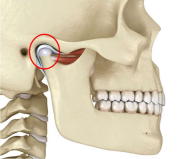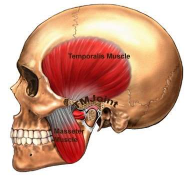WHY DO I HAVE PAIN AND CLICKING IN MY JAWS?
by Cherie Morgan, NP and Dr. John Cumiskey, Chiropractor
WHY DO I HAVE PAIN AND CLICKING IN MY JAWS?
TM Dysfunction, also known as Temporomandibular Dysfunction, is a disorder that affects the joint where the jaw and the temporal bone of the skull meet.
This joint allows the jaw to open and close when speaking, chewing, yawning etc.
There are extremely strong muscles that move the temporomandibular joint such as the Masseter Muscle and the Temporails Muscle. On the inner jaw there are the Pterygoid Muscles.
Temporomandibular Dysfunction (TMD) occurs when the joint is restricted due to problems within the joint or the surrounding muscles. This can lead to common symptoms such as:
Locking or restrictions of the Temporomandibular joint(s)
Pain to one or both jaws
Aching or a “plugging” sensation of the ears
Inability to open mouth wide
Popping/clicking of the joint(s)
Tension Headache
Neck pain
Facial pain
Teeth pain
WHAT ARE SOME OF THE CAUSES OF TMD?
Anxiety and tension leading to clenching and grinding of the teeth
Trauma to the TMJ
Arthritis of the joints
Dental entities
TREATMENT AND MANAGEMENT OF TMD
Botox is serum that is made from botulinum toxin. It temporarily paralyzes muscles by blocking the nerves that make the muscles move. Although it is mostly known for its cosmetic applications, it is used for several muscle related problems, including TMD.
Botox injection into the masseter muscle can relax the muscle allowing the TMJ to move and help relieve the symptoms.
HOW CAN CHIROPRACTIC CARE HELP?
Studies have shown that chiropractic manipulation can be effective to relieve the symptoms of TMD and improve the function of the joint(s).
IS THE TREATMENT PAINFUL?
There are gentle manipulation techniques that are used to treat TMD while minimizing the discomfort of the treatment. Muscle therapies such as ultrasound, gentle exercises and muscle manipulation can be used as well.
Chiropractic care works on the cause of the problem to restore the function of the TM joints. Often associated with TMJ are upper neck (cervical spine) and upper back (thoracic spine) joint dysfunctions. Chiropractic manipulation can restore function to those joints as well.
HOW CAN BOTOX INJECTION AND CHIROPRACTIC CARE WORK TOGETHER?
Botox injection can allow the masseter muscle to relax which can relieve the symptoms of TMD. The effects of Botox are temporary. However, while the muscles are relaxed, chiropractic care can help restore the function of the TMJ which can lead to longer lasting reduction in TMD symptoms.
It is important to remember that there is no cure for TMJ. It is an entity that must be managed. Management can include what has just been mentioned, plus home management as well.
HOW DO I KNOW WHAT MANAGEMENT TO USE FOR MY JAW PAIN?
The first step would to be to have the jaw pain evaluated by Dr. Cumiskey. You then may be referred to Cherie Morgan, NP to see if you are a candidate for Botox injections. If you have been diagnosed with TMD by a dentist or other health care practitioner, we can still evaluate you for chiropractic care and Botox injection.
Journal of Manipulation and Physiological Therapeutics
Chiropractic treatment of temporomandibular disorders using the activator adjusting instrument: a prospective case series. Author links open overlay panel James W DeVocht DC, PhD a, Cynthia R Long PhD b, Deborah L Zeitler DDS c, Walter Schaeffer DC d
Journal of Chiropractic Medicine
Volume 14, Issue 4, December 2015, Pages 279-284
Chiropractic Treatment of Temporomandibular Dysfunction: A Retrospective Case Series Author links open overlay panel
Steven Pavia DC a, Rebecca Fischer DC b, Richard Roy DC, PhD
Life (Basel). 2023 Feb; 13(2): 345.
Published online 2023 Jan 28. doi: 10.3390/life13020345 Preliminary Findings of the Efficacy of Botulinum Toxin in Temporomandibular Disorders: Uncontrolled Pilot Study
José A. Blanco-Rueda, Conceptualization, Investigation,1 Antonio López-Valverde, Methodology, Writing – original draft, Writing – review & editing, Supervision,2,* Antonio Márquez-Vera, Validation,1 Roberto Méndez Sánchez, Formal analysis,3 Eva López-García, Formal analysis,4 and Nansi López
Valverde, Conceptualization, Validation, Writing – original draft, Writing – review & editing5Zuzanna Nowak, Academic Editor and Aleksandra Nitecka-Buchta, Academic Editor


